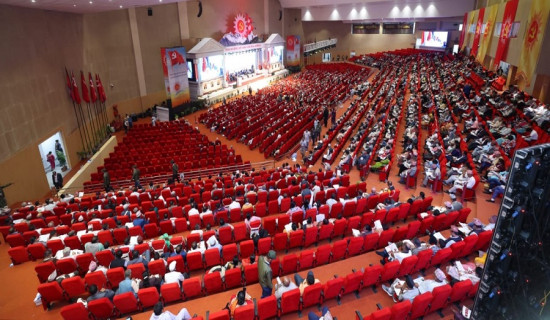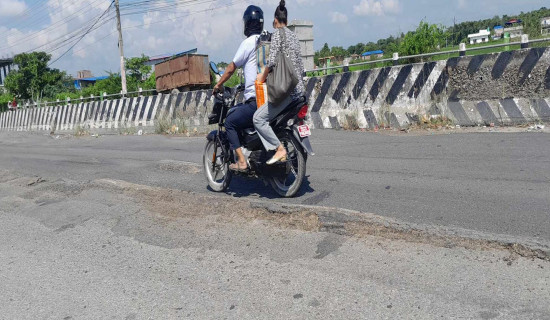- Saturday, 6 September 2025
19th National Anti-Human Trafficking Day
Human trafficking thrives under cover of foreign jobs
Kathmandu, Sept. 6: Nepal marked the 19th National Day Against Human Trafficking and Transportation on Friday. But human trafficking under the pretext of foreign employment continues to proliferate in the country. Although official labour approval is mandatory for working abroad, numerous women are still trafficked without authorisation, particularly to Gulf countries, where they are exploited as domestic workers.
Trafficking networks have now penetrated as deep as rural villages, systematically targeting vulnerable women. Organising various functions in the capital and outside the Kathmandu Valley, the nation observed the day under the theme, “Let all three-tier government join hands: Banish vicious cycle of human trafficking.”
A closer examination of some cases of women illegally trafficked to the Gulf, conducted by the Anti-Human Trafficking Bureau of Nepal Police, reveals that most victims were lured with false promises, often by acquaintances or relatives within their own communities.
These local contacts operate as ‘agents’ for recruitment companies, while the higher-level organisers remain largely invisible in such cases, police claimed.
This pattern demonstrates a deeply entrenched trafficking syndicate that preys on women’s desperation. Many women, especially those who are uneducated and impoverished, are deceived into leaving the country with promises of lucrative employment, only to find themselves trapped in forced labour and exploitation, according to the police.
Superintendent of Police (SP) and Spokesperson for the Bureau, Narendra Kunwar, said, “The disturbing reality is that local agents, motivated by money, often traffic their own relatives, neighbours, and even family members abroad illegally, acting as collaborators for organised traffickers.”
Nepal’s open border with India further facilitates the crime. Five major checkpoints, Jamunaha (Banke), Krishnanagar (Kapilvastu), Sunauli (Rupandehi), Gaddachauki (Kanchanpur), and Gauriphanta (Kailali), allow cross-border movement without passports or identification, making it easy for traffickers to smuggle women into India and onwards to the Gulf, claimed Rita Lama, a counselor at the Migrant Resource Centre in Dang.
Maheshwari Bhatta of Maiti Nepal’s Kanchanpur branch stressed that “The open border enables traffickers to smuggle women into Gulf countries under the guise of foreign employment.”
According to Basanta Pun, coordinator of the Safe Migration Project (SaMi) in Dang, traffickers deliberately prey on economically disadvantaged, illiterate, and socially marginalised women. “Many of the women trafficked are poor, unemployed, and victims of domestic violence,” she explained. “Some are so unaware that they do not even know where they are being taken.”
SP Kunwar said that, tragically, some victims return home bearing children born of sexual exploitation abroad. One such survivor is “Karnali Chaudhary” (name changed), a woman from Bardiya trafficked to the Gulf in 2017. She was sexually abused by her employer, became pregnant, and eventually returned to Nepal with her child.
Police officials confirmed that trafficking methods have evolved. Talking to The Rising Nepal, Dang’s Superintendent of Police, Arjun Prasad Timilsina, said, “Previously, women were trafficked to Indian brothels. Now, the same crime is being carried out under the banner of foreign employment.”
Despite its severity, Nepal’s legal framework remains inadequate. Neither the Foreign Employment Act-2007 nor the Human Trafficking and Transportation Control Act-2007 clearly defines trafficking under the guise of labour migration as a crime. In practice, such cases are often prosecuted as fraud, leaving traffickers largely unpunished, claimed Nepal Police Headquarters DIG and Spokesperson, Binod Ghimire. It shows that our legal provisions should be amended immediately to address such crimes, he said.
“Because the law categorises these cases as fraud, even victims themselves struggle to distinguish whether they were cheated or trafficked,” DIG Ghimire explained. As a result, countless trafficking cases are filed merely as fraud. Survivors of sexual abuse often remain silent due to fear of social stigma.”
DIG Ghimire highlighted three major obstacles: first, legal ambiguities, second, family involvement, which discourages victims from filing complaints, and third, victims’ illiteracy and vulnerability, which prevents many cases from ever reaching the police.
Analysis of police records over the past five years and four months indicates that a total of 2,121 individuals, including women, children, young men, and boys, fell victim to illegal trafficking between 2021 and mid-August 2025. Among these, 731 were women and 394 were children.
During the same period, law enforcement filed 907 cases in various courts. In the preceding fiscal year alone, 335 individuals were identified as trafficking victims, and from April to mid-August 2025, 83 people were reported victimised, with police lodging 34 cases in different courts.
In parallel, authorities detained 1,181 individuals for alleged involvement in trafficking, comprising 809 men and 346 women.
According to SP Kunwar of the Anti-Human Trafficking Bureau, over these five years, police rescued 2,153 victims from across the country. Based solely on officially registered cases, an average of approximately 400 individuals, including women and children, are trafficked from Nepal each year.















